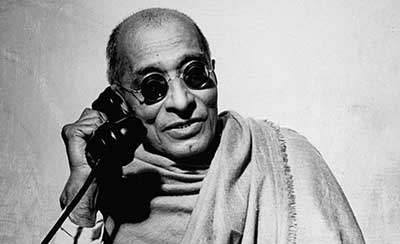Remembering C Rajagopalachari on his birth Anniversary
A great patriot, acclaimed statesman and accomplished scholar, thinker and humanist, Chakravarti Rajagopalachari was the embodiment of the best in Indian life and culture. Rajaji, as he was popularly known, was a man who, by virtue of his sacrifices, humility and simplicity, became an institution by himself.
The great leader and freedom fighter of Indian National movement C Rajagopalachari C. Rajagopalachari was born on December 10 in 1878 in in Thorapalli village of Krishnagiri district, Tamil Nadu. In 1891, he passed his matriculation examination and in 1894, obtained his Bachelor of Arts degree from Central College, Bangalore. Thereafter, he enrolled at the Presidency College, Madras to study law and passed out in 1897.
In 1916, he formed the Tamil Scientific Terms Society, an organisation that translated scientific terms of chemistry, physics, mathematics, astronomy and biology into simple Tamil words. He joined the Indian National Congress and acted as a legal advisor. Rajagopalachari defended Indian Independence activist, P. Varadarajulu Naidu against charges of sedition in 1917.
It was in 1919 that Rajagopalachari met Gandhi for the first time in Madras (now Chennai). He participated in Gandhi’s Non-Cooperation Movement. He was also jailed for two years in Vellore in 1920.
he opened his own ashram to promote Gandhi’s principles of Hindu-Muslim harmony and the abolition of untouchability. He was also a proponent of khadi. When Mahatma Gandhi led the Dandi March in 1930, Rajagopalachari did the same at Vedaranyam, near Nagapattinam in the then Madras Presidency and broke the salt law.
The first Conference of Governors was held at Rashtrapati Bhavan in 1949. It was presided over by Shri C. Rajagopalachari, then the Governor General of India.In the pre-Independence period, he functioned as the Prime Minister of Madras. He was also the first Indian Governor-General of the country. He was Governor of West Bengal for a while. He was also Union Home Minister after Sardar Patel's death. Later, he became the Chief Minster of Madras. A renowned writer, he had many reputed works to his credit. He was also a staunch campaigner for world peace and nuclear disarmament.
He was the first one who received India's highest civilian award the Bharat Ratna. He also became the Editor of Mahamta Gandhi's newspaper, Young India. He wrote a Tamil translation of the Ramayan, which was later published as Chakravarthi Thirumagan. The book won the Sahitya Akademi Award in Tamil language in the year 1958.
Rajaji and Swatantra party :
After Independence, Rajagopalachari was chosen to be the last Governor-General of India, in the absence of Lord Mountbatten. His tenure lasted from June 21 in 1948 to January 26 in 1950. He founded the Swatantra Party in 1959, which favoured classical liberal principles and free enterprise. The decision to establish the Swatantra Party was announced at a public meeting in Chennai on 7 June 1959, to provide a liberal alternative to the ruling Congress. Its first national convention was held in Mumbai a few weeks later. The Swatantra Party had emerged as the biggest opposition party in India by 1967.
The Swatantra Party stands for the protection of the individual citizen against the increasing trespasses of the State. It is an answer to the challenge of the so-called Socialism of the Indian Congress party. It is founded on the conviction that social justice and welfare can be attained through the fostering of individual interest and individual enterprise in all fields better than through State ownership and Government control. It is based on the truth that bureaucratic management leads to loss of incentive and waste of resources.
In 1939, Rajagopalachari issued the Temple Entry Authorization and Indemnity Act, under which Dalits and Shanars were allowed to enter temples. This was a major boost to abolish untouchability and caste prejudice.
Rajaji, coined the expression “Permit-Licence Raj” to describe a dispensation more intrusively tyrannical than the one it had replaced: the British Raj. After the infamous 1955 Avadi session of the Congress party, the government of the day adopted “industrial licensing” as its stated policy.








